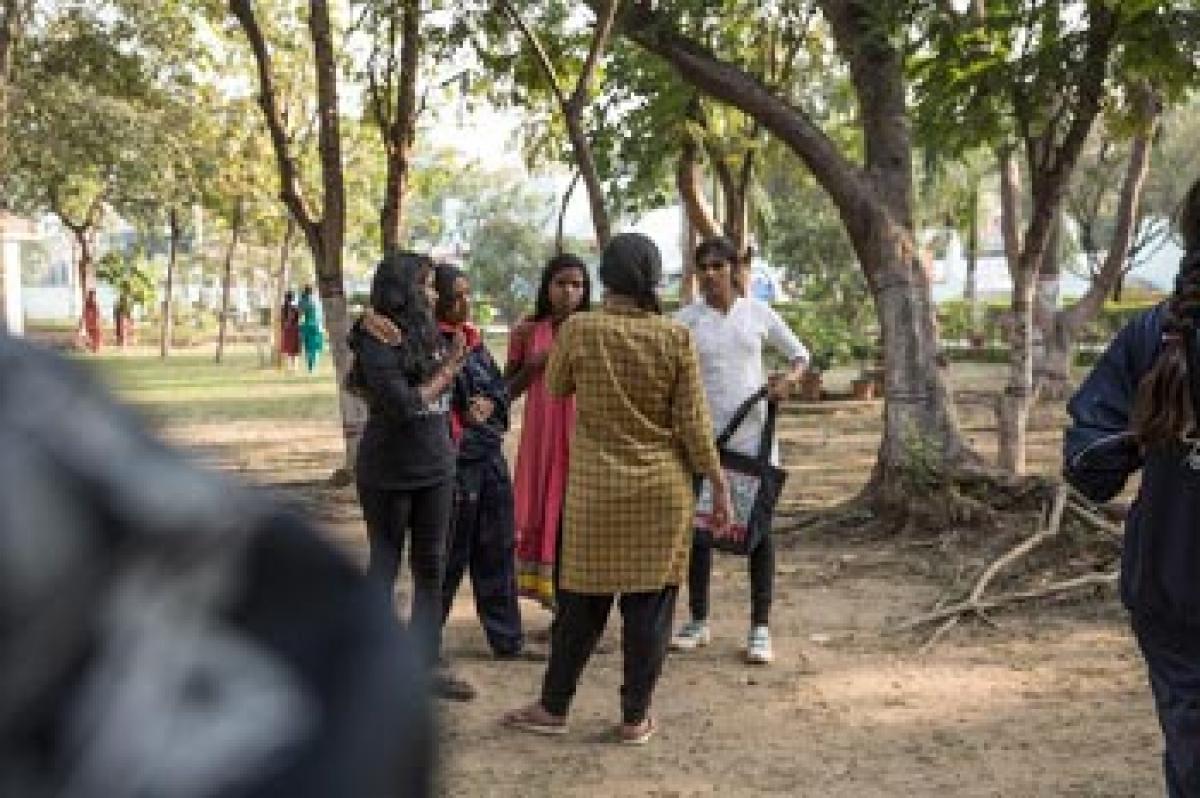Live
- ‘Bachhala Malli’ trailer heightens anticipation
- Karnataka quota row: Backward Class forum chief warns Lingayat seer over 'tinkering with reservations'
- Tight security arrangements at Group-II examination centers District SP
- Alia Bhatt captures attention in white
- Varun Dhawan talks about ‘Baby John’
- ‘Moonwalk’ trailer promises a quirky heist, love, and loyalty
- Combat leaf spot disease
- Ahsaas Channaopens up about her complex character in ‘Mismatched 3’
- Radhika Apte welcomes first child, shares heartfelt post
- Jacqueline dazzles at Da-Bangg Reloaded concert
Just In

It began with two Indian women hanging out on Mumbai streets in defiance after a series of violent crimes against women. It has since grown and even spread to Pakistan, as women assert their right to public spaces in male-dominated societies.
Mumbai : It began with two Indian women hanging out on Mumbai streets in defiance after a series of violent crimes against women. It has since grown and even spread to Pakistan, as women assert their right to public spaces in male-dominated societies.
The Why Loiter? street campaign was inspired by a book of the same name, that examined the risks for women on Mumbai's streets. It came as an intense spotlight fell on women's safety in India following the 2012 fatal gang rape of a student on a bus in Delhi and the 2014 rape of a woman by her Uber taxi driver in Delhi.
While the 2012 gang rape triggered massive protests and led to the tightening of rape laws in India, some of the reaction to it and the Uber rape blamed the victims, said Sameera Khan, co-author of Why Loiter? "It's the same blame game every time: why was she out that time of night? Why was she alone? Or who was she with? It's all so hostile, and made out to be the victim's fault," said Khan in Mumbai.
"But why is it okay for women to only be out at certain times or for certain reasons? Why should anyone question a woman's right to be in a public space at any time?" The number of rapes in India rose by 9 per cent to 33,707 in 2014, according to official data. The country's conservative and patriarchal attitudes mean victims of sexual assault are often shunned by their families and communities and blamed for the violence perpetrated against them, say activists and lawyers.
While the numbers of working women and female students are on the rise in India, it is unusual to see women out by themselves at night. In a Thomson Reuters Foundation poll of 15 of the world's major cities, Delhi ranked as having the fourth most dangerous transport systems for women. Mumbai, India's financial hub, is regarded as being safer, but attitudes toward women in public spaces are just as conservative, said Neha Singh.
Singh leads women on walks and bicycle rides in various parts of the city with other women, and curates a blog called Why Loiter? The women have encountered men who follow them and heckle them, and policemen telling them to go home. "The concept that women, like men, can just be loitering in a public space, without doing anything else, is so alien to them," she said.
"They immediately think she must be a prostitute or somehow inviting trouble and must be told off or sent home," said Singh, after a rehearsal of a play called Loitering, to be staged on March 8 to mark International Women's Day. The campaign has prompted a demand to relax curfews in Indian colleges, where women have stricter curfews than men, and a movement in Pakistan called Girls@Dhabas, referring to the no-frills restaurants typically frequented by young men.
In India, recent campaigns including #SelfiewithDaughter and Prime Minister Narendra Modi's 'Beti padhao, beti bachao' (educate your daughter, save your daughter) have helped increase awareness of women's rights. New Delhi is now one of 25 cities which are part of the United Nations' safe cities project, with measures to improve street lighting, install toilets, set up helplines and strengthen laws on sexual harassment.
Municipal officials however, admit that ending sexual violence will also need sustained public campaigns that dispel sexism and challenge gender stereotypes. "We cannot, as a nation, claim progress until women can feel safe anywhere any time," said Singh.
By Rina Chandran

© 2024 Hyderabad Media House Limited/The Hans India. All rights reserved. Powered by hocalwire.com







